Manor
A downloadable game for Windows
The subject of the game is the management of a manor in Bohemia in the era after the Thirty years' war. The goal is to make the game as realistic as possible, and make the player's options really corresponding to what the owner of the manor, with the help of his officials, could do with the manor and its serfs, and to make the economic system as close as possible to how the manor's economy actually worked. There are many city-building strategic games with beautiful graphics, but the economic system usually does not correspond to medieval or early modern reality at all.
The game is still in a very early stage of development, the graphics are simple, many mechanics are still missing and those that are already in the game are only roughly done (and may not correspond the mentioned historical reality yet).
The English translation is still very rough and may contain errors. It was often difficult or impossible to find a proper English equivalent to a Czech or Central European term, due to the historical differences between British Isles and the Continent. Any corrections or suggestions will be greatly appreciated.
The game is free, but if you want, you can donate any amount when you download it.
What can you do in the game so far?
Manor is a fundamental economic and administrative unit, belonging to one owner – the lord of the manor. It consists of a number of villages or towns with serfs and of diverse manorial facilities. The centre of the manor is a chateau – the seat of the lord of the manor and of the manorial officials. From the chateau menu, the panels for particular sections of administration can be opened:
- In the rustical section, the serfs' homesteads and their burden can be administered.
- In the dominical section the manorial facilities – meierhofs, mills, brewery and other enterprises can be administered.
- In the officials section you can hire and fire manorial officials, which are needed for effective administration of the manor.
- In the chateau section you can set expenses for chateau maintenance, for living and for representation. You can also take a loan when needed.
The game is turn based – one turn corresponds to one month. The landscape changes accordingly to the season of the year.
The top panel informs about current date, amount of money in the treasury, average serfs' contentment and renown of the lord of the manor. The notifications panel informs about income for given month and about what happened in that month. Detailed accounts of income and expenses for the given month can be shown.
Rustical – serf homesteads and their duties
Homesteads are divided according to size into peasant homesteads with a full sized field, cottages with a half sized field, and small houses with no field. Each homestead has its holder (peasant, chalupner, cotter). (Translation note: no proper english equivalents have been found to distinquish the two lower classes "chalupník" and "domkář". For chalupník, the german term chalupner is temporarily used.)
According to the type of tenure, the homesteads are divided into purchased and unpurchased. Purchased homesteads are held in hereditary tenancy (emphyteusis) and its holder has the rights to it. Whereas holder of an unpurchased homestead can be expelled from the homestead by the manor lord at any time.
When a holder of purchased homestead dies, his son will inherit the homestead. When a holder of unpurchased homestead dies, his son must ask the manor lord for assigning the homestead to him. Serf can purchase the homestead by paying a certain amount.
Settled serfs (i. e. those, who hold a homestead) are obliged to pay set monetary and natural charges to the manor lord and to carry out corvey (unpaid forced work) on a manorial meierhof. The scope of duties is prescribed in the urbarium.
The monetary rents are paid in two terms: in April on St. George day and in October on St. Gallus day. The amount of rents is set for eternity, and therefore can't be changed. The corvey is divided into horse corvey, which is carried out only by peasant with horses, and hand corvey, which can by carried out by anyone. The corvey load for a serf is set as a number of days in a year.
Serfs can die, in which case is their homestead either inherited by their son, or stays deserted. If the homestead is deserted (empty), it can be assigned to a serf without homestead. If the homestead is destroyed, its new holder gets a certain period, in which he is exempted from paying the charges. A serf may also ask for temporary remission of rents on his own, when his homestead is damaged.
The serf can ask for a letter of release, by which he is released from serfdom and allowed to move out of the manor.
The serfs are constrained by beer coercion, i. e. obligation to buy beer only from their manor lord, and by mill coercion, i. e. obligation to have their grain ground only in mills of their manor lord. They can be punished for violating the coercion.
Dominical – meierhofs and other facilities
Meierhofs (large farms owned by the manor lord) are the cornerstone of the dominical economy, i. e. that part of the manor, which is managed by the manor lord under own direction.
For each meierhof you can hire manager called schaffer, the female manager with specific duties called schafferin, and a number of farmhands. You can buy and sell livestock and designate, from which villages the serfs will be coming to carry out corvey.
Income from meierhof consists from earnings from selling grain and earnings from livestock. The earnings from grain are mainly affected by the size of harvest, which is affected by the weather and the extent of cultivation of the fields. The earnings from livestock are affected by number of animals, condition of the building and number of farmhands, who take care of the livestock.
Other dominical facilities are mills, brewery and the administration of ponds and forests. At all these buildings you can set the maintenance expenses and hire or fire their manager.
At the brewery you can hire the master brewer, cooper and helper and you can set the source of grain and hops: it can be either taken from the manorial meierhofs, or bought from outside of the manor.
Manor officials
Various manorial officials participate in the administration of the manor.
The most important official is the captain, who is the head of the manorial office and manages the administration of the manor.
The burgrave is in charge of the manor's economy. If not occupied, the status of the dominical buildings is unknown.
The rent clerk is in charge of finances. If not occupied, total income and expenses are unknown.
Another official is the grain clerk. The following managers of the individual facilities are subordinate to the officials: the brewer, the forester, the fishmaster, the millers and the schaffers in the meierhohs.
The representatives of the manor lord in the villages and the town are the bailiffs, who are also sellers of the manorial beer.
Facebook page: https://www.facebook.com/manor.thegame
| Status | In development |
| Platforms | Windows |
| Author | Dějiny |
| Genre | Simulation, Educational |
| Made with | Unity |
| Tags | 2D, Historical, Management, realistic, Singleplayer, Turn-based |
| Average session | About an hour |
| Languages | Czech, English |
| Inputs | Keyboard, Mouse |
Download
Click download now to get access to the following files:
Development log
- Version 0.13.0Jun 27, 2024
- Version 0.12.3Jan 08, 2024
- Version 0.12.2Jan 06, 2024
- Version 0.12.1Dec 24, 2023
- Version 0.12.0Dec 18, 2023

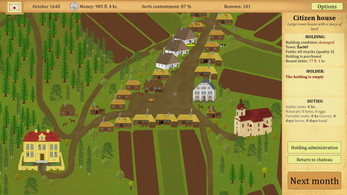

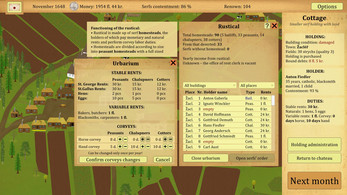
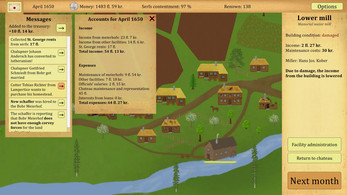
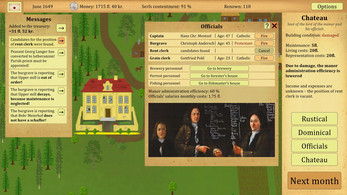
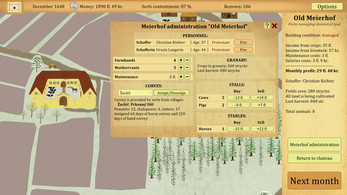
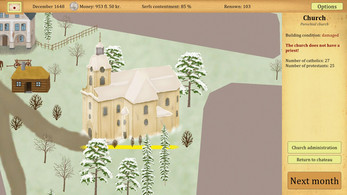
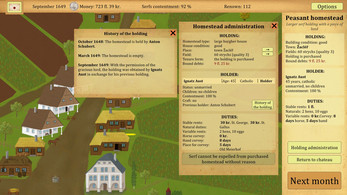
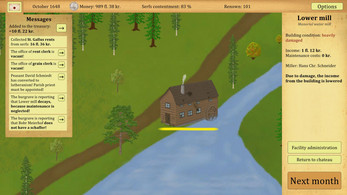
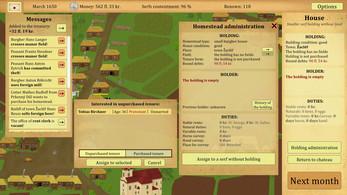
Comments
Log in with itch.io to leave a comment.
Hey, I have (at laaast :D), played Manor. It was fun. As promised, here is my feedback :
What I have liked :
What I did not like or did not understand :
It is a good start, now I am curious to see where you will lead the game : more interactions with your folks, your churches, your manor (in fact more micro management) ? Or more interactions with surrounding villages, princes or kings or armies (more macro management) ? Both directions would be interesting, but it might be something completely different. If you can tell me (us), I am interested.
If you want a more detailed advice on a point, I would be glad to give it to you !
Hello, thank you!
Thank you very much once again. If anything from what I wrote is still unclear or some other questiong or ideas arose from that, I'll be glad to answer.
Btw. how is your game going? Will there be a new version any soon? :D
It is very kind of you to answer my post. All answers fit me. I like a lot that you try to make Manor a game that is historically acurate. I think that it as a good way to make people discover a history they do not know : in France, central Europe history is not well known, for instance. It is sad, but, it means that we have a lot to learn with your game.
I have another question. These kinds of posts reflect a discussion between you and me, but I think it may interest other players of Panství . Does it fit you if we continue discussing like this of your games ? (otherwise, I will send you direct messages through reddit, apparently itch.io does not allow direct messenging ).
(I have not worked a lot on my game, due to my real work, but I will be able to code in august : I will tell you as soon as another version is ready.)
Public discussion is completely fine.